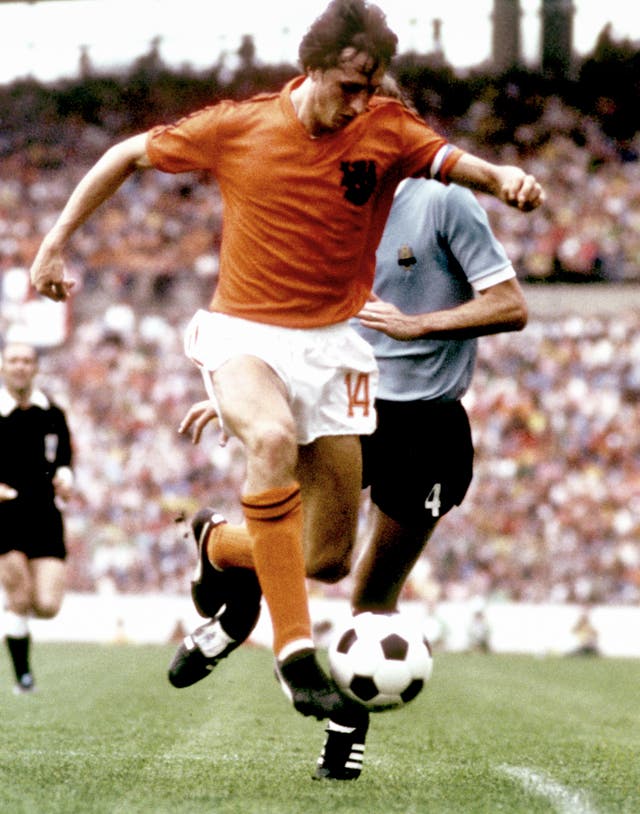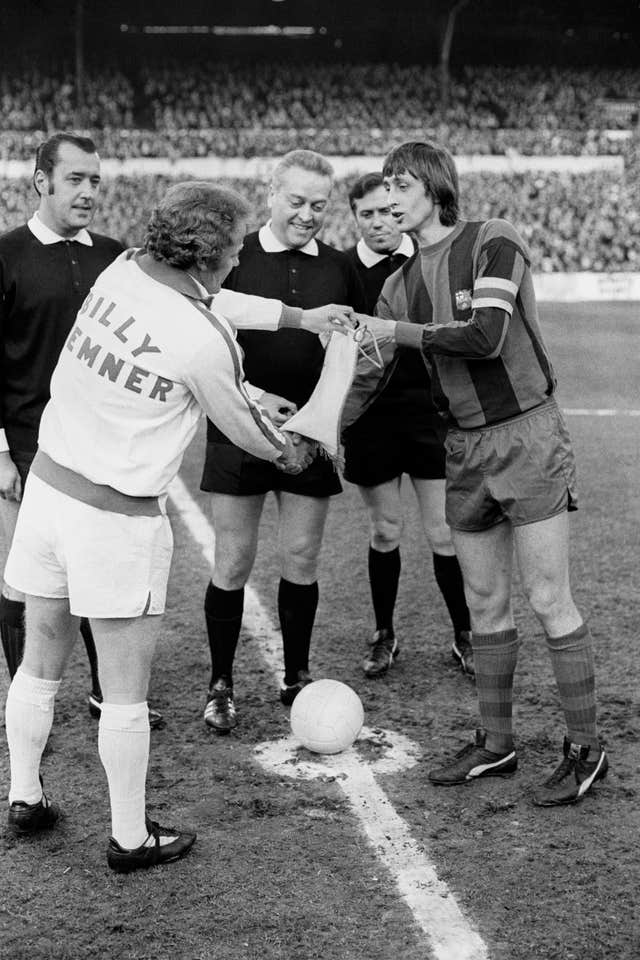Johan Cruyff's death at the age of 68 saw one of football's riches talents rightly celebrated for his contribution to the world game.
Four years to the day since his death, the PA news agency looks back at some of the highlights of his illustrious career.
The Cruyff Turn
🔙 45 years ago today, during the 1974 @FIFAWorldCup, the Cruyff Turn was born at the Westfalenstadion in Dortmund! 👊 #CruyffLegacy @FIFAcom pic.twitter.com/BZIPI1nJ5J
— Johan Cruyff (@JohanCruyff) June 19, 2019
This snapshot of individual brilliance captivated a global audience and was immediately named after its creator. Cruyff's bamboozling of Sweden's Jan Olsson with a quick change of direction, leaving the defender on his backside, was the defining image of the 1974 World Cup, where Holland's "total football" thrilled onlookers and took them all the way to the final. Cruyff was named player of the tournament and won a penalty just a minute into the final against West Germany, but ultimately ended up with a losers' medal.
The phantom goal
On this day in 1973, Johan scored this extraordinary goal against Atlético! 🤺 #CruyffLegacy pic.twitter.com/rd93aDeV70
— Johan Cruyff (@JohanCruyff) December 22, 2018
Cruyff scored 48 goals for Barcelona, but few are remembered as fondly as the one also dubbed "Cruyff's impossible goal". In a game against Atletico Madrid in 1973, the Dutchman leapt into the air outside the far post, diverting a cross past goalkeeper Miguel Reina with the outside of his right heel at chest height.
That penalty
36 years ago today, Johan took his only penalty for @AFCAjax. Fair to say it was a legendary one.⠀"With Christmas coming up it seemed like a nice idea to do it so that people have something to talk about," said Johan after the game. #CruyffLegacy @NOS @NOSsport pic.twitter.com/J581IhyCLd
— Johan Cruyff (@JohanCruyff) December 5, 2018
Cruyff returned to childhood club Ajax in 1980, achieving what few players are able to do in scoring a memorable penalty. In 1982 in a match against Helmond Sport, Cruyff opted not to shoot but instead tap the spot-kick sideways to team-mate Jesper Olsen, who knocked the ball back for Cruyff to turn it into the net with goalkeeper Otto Versfeld totally confused. Lionel Messi and Luis Suarez recreated the same penalty in Barcelona's 6-1 win over Celta Vigo in February and afterwards Cruyff said, "What Messi did thrilled me. If anyone can get away with that, it's him."
Two stripes are better than three

The Dutch federation (KNVB) had a deal with adidas to supply the national team kit for the 1974 World Cup in Germany. However, Cruyff had a personal sponsorship deal with sportswear rivals Puma and made it clear to the KNVB he was unwilling to wear adidas' trademark three stripes. Cruyff insisted on having a two-striped version instead and such was his importance and influence to the Dutch, his request was granted.
History with Ajax
Top 14 goals of @JohanCruyff! 😍
What's your favourite? #vooraltijdnr14 pic.twitter.com/zpfTIu6IL6
— AFC Ajax (@AFCAjax) April 25, 2019
Cruyff joined the Amsterdam club as a 10-year-old and during the 1965-66 season, his second as a senior player, scored 25 goals in 23 games as Ajax won the first of six league championships in eight seasons. He also helped them to three successive European Cup triumphs from 1971 to 1973, their first European trophies. Cruyff returned in 1980 to guide the club to two more league titles and following his retirement as a player, he followed his mentor Rinus Michels into the manager's hot-seat. He won only two Dutch Cups and the European Cup Winners' Cup, although his attacking football was more than evident as they lost the 1985-86 title to PSV despite having a goal difference of +85.
Barcelona

Arriving as a then world-record transfer fee of 2million US dollars in the summer of 1973, Cruyff helped the club win LaLiga for the first time since 1960, and produced an inspirational performance in a 5-0 win over Real Madrid at the Bernabeu. In contrast to the rest of his career, he had more of an influence as a manager, winning the league title four times between 1991 and 1994 as well as the 1989 European Cup Winners' Cup final before guiding the club to a first European Cup success at Wembley in 1992. His legacy was much longer-lasting, however, as the brand of football he played became ingrained at the club – as a player, Pep Guardiola learned much from him which he then translated into his own coaching style.







